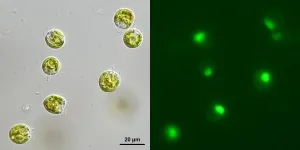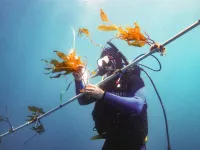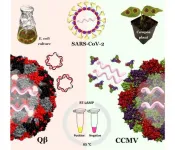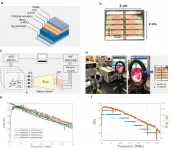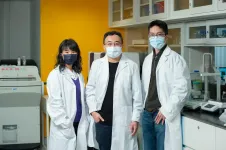Even just a bit of advertising changes the game in word-of-mouth marketing
Whether selling products or communicating about vaccines, the tiniest bit of advertising changes the game
2021-03-02
(Press-News.org) Nearly everything author Malcolm Gladwell said about how information spreads in his 2000 bestseller "The Tipping Point" is wrong, according to a recent study led by UCLA professor of sociology Gabriel Rossman.
"The main point of 'The Tipping Point' is if you want your idea to spread, you find the most popular person in the center of any given network and you sell them on your idea, and then they'll sell the rest of the world on it," Rossman said.
But Rossman's latest study, recently published in Proceedings of the National Academy of Sciences, pokes holes in that widely accepted notion by showing how the presence of even just a bit of advertising or other mass communication -- "top-down" information that comes from outside the network -- effectively equalizes the influence of everyone across the network.
Rossman, together with co-author Jacob Fisher of Duke University and the University of Michigan, used a statistical programming language called R to build out network maps based on several different datasets. One set harnessed Twitter posts, along with retweets and mentions, over two weeks in 2011. Another used the Democratic National Committee email network from WikiLeaks' 2016 data dump. Another used the emails of Enron executives subpoenaed in 2002. Six others were randomly generated.
These provided a network structure -- a web of dots and lines showing how users in each network were connected to one another. Once those maps existed, Rossman and Fisher were able to see how quickly an idea might spread throughout the network if it started from the network's single most important person or if it started from someone chosen at random.
They looked at that information spread in several ways, comparing via computer simulation how information moved throughout the networks when it came solely through word-of-mouth within a network ("bottom up"), when it came solely through external advertising or public information ("top down") and when it came through varying bottom-up and top-down combinations.
What they discovered refutes Gladwell's concept that network position is always paramount. They found that in instances where there is even a small amount of advertising -- even when it is just a quarter of a percent as strong as word-of-mouth -- there's virtually no difference between the influence of the person at the center of a network and those further out on the string.
"It's not that word-of-mouth doesn't matter -- it's that nobody is particularly important for the word-of-mouth process," Rossman said. "What we saw is that when advertising doesn't exist, when advertising is exactly zero, it looks like whoever is Mr. Popular, whoever has the most central connections, really matters. And in that scenario, if you start with that person at the center of the network, like the leader of an organization or company, rather than the intern, then whatever you're selling gets an uptick."
But it takes only an incredibly weak amount of advertising to effectively neutralize the dominance of Mr. Popular, Rossman said. "Just a small amount changes the dynamic so that it practically doesn't matter whether you start with Mr. Popular or the intern."
Rossman is an expert on information spread in culture and mass media and is the author of "Climbing the Charts: What Radio Airplay Tells Us About the Diffusion of Innovation."
The findings of his latest study, he notes, have wide-ranging implications, from selling products to a specific audience to understanding how to share information on vaccines with vulnerable communities.
"There's a reasonably big body of literature that says you should find someone who appears to be structurally important to the network you're trying to connect with," he said. "We're arguing that, if advertising exists, you can just pick somebody at random in the network and you'll get just as good results as if you found the absolutely ideal person to start with."
INFORMATION:
ELSE PRESS RELEASES FROM THIS DATE:
2021-03-02
Law enforcement seizures of drugs, particularly marijuana and methamphetamine, dropped at the beginning of the COVID-19 pandemic, then increased significantly in the following months--exceeding pre-pandemic seizure rates and providing clues about the impact of the crisis on substance use, according to a new study in the journal Drug and Alcohol Dependence.
The research was conducted as part of the National Drug Early Warning System (NDEWS), which uses real-time surveillance to detect early signals of potential drug epidemics. NDEWS is led by a team of researchers at the University of Florida, New York University, and Florida Atlantic University, ...
2021-03-02
While natural disasters and economic recessions traditionally unleash an uptick in child abuse, a new study suggests that cases may have declined in the first months of the pandemic, compared with the same timeframe in previous years.
In the study, led by UCSF Benioff Children's Hospitals and Children's Mercy Kansas City, researchers tracked the number of pediatric inpatients ages 5 and under in 52 children's hospitals nationwide for the first eight months of 2020. They found a steep decline in the number of ER visits and hospital admissions, including those requiring treatment for physical abuse. This started in mid-March - around the time some states issued shelter-in-place ...
2021-03-02
A Ludwig-Maximilians-Universitaet (LMU) in Munich team has shown that slight alterations in transfer-RNA molecules (tRNAs) allow them to self-assemble into a functional unit that can replicate information exponentially. tRNAs are key elements in the evolution of early life-forms.
Life as we know it is based on a complex network of interactions, which take place at microscopic scales in biological cells, and involve thousands of distinct molecular species. In our bodies, one fundamental process is repeated countless times every day. In an operation known as replication, proteins duplicate the genetic ...
2021-03-02
New research suggests that the ability of green algae to eat bacteria is likely much more widespread than previously thought, a finding that could be crucial to environmental and climate science. The work, led by scientists at the American Museum of Natural History, Columbia University, and the University of Arizona, found that five strains of single-celled green algae consume bacteria when they are "hungry," and only when those bacteria are alive. The study is published today in The ISME Journal.
"Traditionally, we think of green algae as being purely photosynthetic organisms, producing their food by soaking in sunlight," said Eunsoo Kim, an associate curator at the American Museum of Natural History and one of the study's corresponding ...
2021-03-02
An international team led by Prof. dr habil. Andrzej Niedzielski, an astronomer from the Nicolaus Copernicus University in Torun (Poland), has discovered yet another three extrasolar planets. These planets revolve around the stars that can be called elder sisters of our Sun.
You can read about the astronomers' success in Astronomy and Astrophysics. The prestigious European journal will publish the paper: Tracking Advanced Planetary Systems (TAPAS) with HARPS-N. VII. Elder suns with low-mass companions. Apart from Prof. Andrzej Niedzielski from the NCU Institute of Astronomy, the team which worked on the discovery includes Prof. dr habil. Gracjan Maciejewski, also from the NCU Faculty of Physics, Astronomy and Informatics, Prof. Aleksander Wolszczan (Pennsylvania State ...
2021-03-02
For several years now, the biofuels that power cars, jet airplanes, ships and big trucks have come primarily from corn and other mass-produced farm crops. Researchers at USC, though, have looked to the ocean for what could be an even better biofuel crop: seaweed.
Scientists at the USC Wrigley Institute for Environmental Studies on Santa Catalina Island, working with private industry, report that a new aquaculture technique on the California coast dramatically increases kelp growth, yielding four times more biomass than natural processes. The technique employs a contraption called the "kelp elevator" ...
2021-03-02
Australia's marine World Heritage Sites are among the world's largest stores of carbon dioxide according to a new report from the United Nations, co-authored by an ECU marine science expert.
The UNESCO report found Australia's six marine World Heritage Sites hold 40 per cent of the estimated 5 billion tons of carbon dioxide stored in mangrove, seagrass and tidal marsh ecosystems within UNESCO sites.
The report quantifies the enormous amounts of so-called blue carbon absorbed and stored by those ecosystems across the world's 50 UNESCO marine World Heritage Sites.
Despite covering less ...
2021-03-02
Rapid COVID-19 tests are on the rise to deliver results faster to more people, and scientists need an easy, foolproof way to know that these tests work correctly and the results can be trusted. Nanoparticles that pass detection as the novel coronavirus could be just the ticket.
Such coronavirus-like nanoparticles, developed by nanoengineers at the University of California San Diego, would serve as something called a positive control for COVID-19 tests. Positive controls are samples that always test positive. They are run and analyzed right alongside patient samples to verify that COVID-19 tests are working consistently and as intended.
The positive controls developed at UC San Diego offer several advantages over the ones currently used in COVID-19 testing: ...
2021-03-02
Around the world there are currently more than 18 billion internet-connected mobile devices. In the next 10 years, anticipated growth in the Internet of Things (IoT) and in machine-type communication in general, will lead to a world of hundreds of billions of data-connected objects. Such growth poses two very challenging problems:
How can we securely connect so many wireless devices to the Internet when the radio-frequency bandwidth has already become very scarce?
How can all these devices be powered?
Regular, manual charging of all mobile Internet-connected devices will not be feasible, and connection to ...
2021-03-02
A Hong Kong Baptist University-led (HKBU) research team has developed a novel drug which has the potential to become a next-generation treatment for cancers associated with Epstein-Barr virus (EBV).
The peptide-linked drug, which is responsive to the acidic environment found in tumours, is the first known agent to have successfully targeted two viral proteins that are simultaneously produced by EBV. It also offers a new strategy by increasing the uptake of anti-cancer drugs in tumour cells, thus allowing the application of lower drug dosages which helps reduce treatment side effects and health risks.
The research results were published in the international academic journal Advanced Science.
New drug targets ...
LAST 30 PRESS RELEASES:
[Press-News.org] Even just a bit of advertising changes the game in word-of-mouth marketing
Whether selling products or communicating about vaccines, the tiniest bit of advertising changes the game
